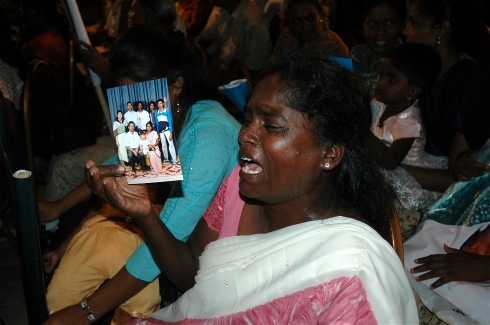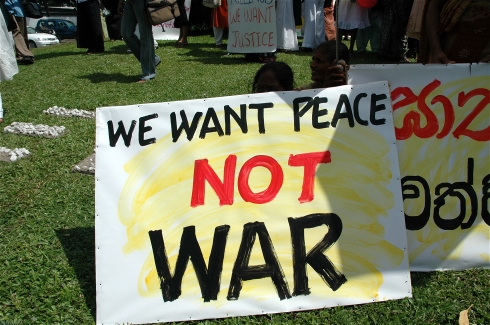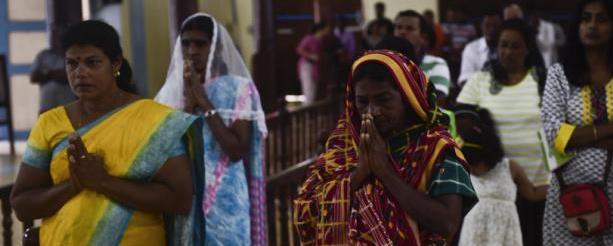[Madhu Shrine]
MANNAR, 28 January 2015 (IRIN) – Less than three weeks since Sri Lanka voted in a new president, rights activists and other NGOs say there are already encouraging signs that they may have more freedom to work under the new administration, including in the former conflict zone in the north.
Six days after the 8 January election, around 300 families of those still missing as a result of Sri Lanka’s two and half decade long civil war attended a prayer service led by Pope Francis at the Madhu Shrine in the northwestern district of Mannar. Some held pictures of missing relatives; others held small signs calling for justice. But in a marked departure from the pattern of recent years, security forces prevented no one from protesting or entering the shrine compound.
Uthayachandra Manuel, a community activist in Mannar who heads the Association of Families Searching for their Disappeared Relatives, recalls quite a different reaction from the authorities during visits by former UN High Commissioner for Human Rights Navi Pillay and British Prime Minister David Cameron in August and November 2013.

“There was a lot of harassment then. People were stopped from coming out; police would interview them and ask them to come to the station; one or two have been detained as well,” Manuel told IRIN. Her own activism began in 2008 when her eldest son was arrested. He has not been heard of since.
“The Criminal Investigation Department kept close tabs on me to find out what I was doing. They will visit families after each protest. That has been usual in the last five years,” she said.
When Pope Francis visited Sri Lanka earlier this month, Manuel and others in her group were able to hand him a letter containing the details of more than 3,300 missing persons and asking for his assistance in investigating their disappearance.
“This time no one came to look for me; no one blocked us from getting into the church compound, or holding up pictures of the missing family members,” she said.
Change in the air?
NGOs faced extreme scrutiny under the previous long-term President Mahinda Rajapaksa, particularly those working on human rights or issues related to the legacy of the conflict in the north. But optimists within the humanitarian community in Sri Lanka believe the early signs auger well for improvements under the new government of Maithripala Sirisena, who promised during the election campaign to arrest the nation’s drift towards dictatorship.

“There has been a marked change since the elections. Activists are more free to express themselves and talk in public,” Keerthi Teenakoon, the executive director of the national advocacy body Centre for Human Rights and Research (CHR), said.
CHR felt sufficiently confident in the apparent easing of restrictions to launch a public campaign to reopen an investigation into a 2012 prison riot in the capital Colombo that left 27 people dead. In the past, lawyers who spoke out in public about the incident received death threats.
But others remain cautious. Ruki Fernando, a prominent human rights activist who works in the north, believes it is too early to judge the intentions of the new political leadership.
“There are signs that the changes visible in the capital are yet to manifest themselves in the north,” he told IRIN. Fernando said he knew of two activists in the north who were still in hiding for fear of state sponsored reprisals. Another young man, released in November after seven years in detention, was questioned by police soon after the recent election for no discernable reason.
But Fernando acknowledged that, in time, restrictions on advocacy work in the north could be eased if activists engage the new administration early. “I think we should push the boundaries of what we have been doing and seek answers to issues like the missing.”
Thorny issues remain
The issue of those still missing after the end of the war in 2009 has been vexed. A presidential commission set up under the previous government has so far received details of more than 20,000 cases, including at least 5,000 members of the Sri Lankan defence forces.
The International Committee of the Red Cross has more than 16,000 cases reported by relatives of people missing since 1990. Meanwhile a report by the UN Secretary-General’s Advisory Panel on Sri Lanka said the figure could be as high as 40,000.
So far there has been no national mechanism to trace or locate the missing. The previous government indicated to IRIN it was willing to consider a tracing mechanism if recommended by the presidential commission. It had been expected to hand over its report by the middle of this year, but it is unclear whether it will continue to exist under the new government.
Meanwhile, the new leadership has said that it would be more cooperative with the UN Human Rights Council, which has launched an investigation into alleged abuses committed during the protracted war in Sri Lanka. Former President Rajipaksa was implacably opposed to the probe, contesting its mandate. Although the new Foreign Minister Mangala Samaraweera signaled a thawing of relations with the UN body, he also said the new government still prefers a national investigation.
Despite early conciliatory gestures, the new Sri Lankan government may find it hard to gain international acceptance for such an investigation.
“Sri Lanka unfortunately has a long and troubling history of setting up ad hoc bodies at politically opportune times, which have invariably been ineffective and failed to deliver justice,” said David Griffiths, deputy Asia Pacific director at Amnesty International.
“Any such inquiry established by President Sirisena must be genuinely independent, have adequate scope and resources, and crucially lead to the prosecution of those most responsible for the commission of these crimes.”
ap/rh/am
